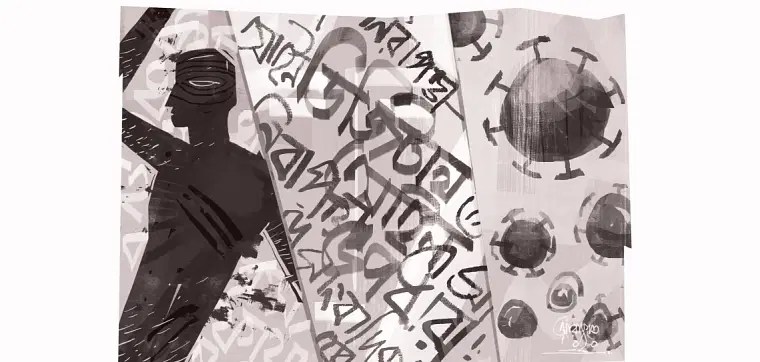
On the night of 11 October, journalist Ilias Hossain of the Narayanganj daily Dainik Bijoy, was hacked to death. The local people managed to catch one of the killers on the spot and handed him over to the police. The police arrested others too. It is widely speculated that he was killed for his reporting on illegal gas connections and the drug trade. The recent explosions in a Narayanganj mosque, leaving 34 dead, is perhaps enough evidence of the dire dangers caused by such illegal gas connections.
Ilias Hossain’s death is a reminder once again of the risks that a journalist faces. It also brings two other issues to the fore. One, journalists are not just victims of the government and powerful politicians’ ire, but are also seen by other criminals as the enemy too. Two, the small-town (mofussil) journalists are no less in danger. As some of the suspects were arrested, it will be possible to speedily bring Ilias Hossain’s killers to trial. But given the track record of the oppression and killing of journalists in Bangladesh, it is difficult to be hopeful.
The bold reporting of the newspersons revealed the corruption of the ruling party leaders and activists in filching relief materials. An innumerable number of journalists were beaten up for reporting and taking photographs of relief goods being misappropriated. There is no official account of their number, not even with the journalist unions.
Quite a few journalists died of coronavirus too, 32 in all. Of them, 21 had tested positive for coronavirus and 11 had symptoms. And over 1000 journalists were infected with the virus.
According to records of the global organisation Committee to Protect Journalists (CPJ) on 23 July, at least 22 journalists in Bangladesh faced cases and attacks in the first 70 days of the coronavirus outbreak of the country, from 10 March to 21 May. They include Manab Zamin editor Matiur Rahman Chowdhury and BDNews 24 chief editor Toufiq Imrose Khalidi. Most of the others work outside of Dhaka.
Dhaka-based NGO, MRDI (Management and Research Development Initiative) last month held a virtual discussion with media workers outside of Dhaka. The discussion on the experience of journalists during coronavirus focused on the extent of the risks they faced as well as institutional, family and social support.
The organisers informed me about the pressure these correspondents faced from the newsroom and the lack of institutional support when it came to their security. Other than the journalists of a handful of newspapers and media houses, they were not given personal protective equipment (PPE) or any special risk allowance. Even if they contracted coronavirus, they were taken care of by their families and the community. Quite a few journalists died of coronavirus too, 32 in all. Of them, 21 had tested positive for coronavirus and 11 had symptoms. And over 1000 journalists were infected with the virus.
Again, when it comes to credibility of the news on the social media, the newspapers remain in the lead. The importance of professionalism when it comes to the accuracy, importance and relevance of the news, comes even more to the limelight during crises and disasters.
Many of the journalists outside of Dhaka work part time, some even work with no wages, simply out of passion for the profession. There are, of course, allegations of irregularities and dishonesty against a couple of them. But then again, such allegations can be levelled against persons in any profession, particularly when it comes to political opportunism.
In the reality of the absence of an effective opposition, the government will become detached from the public if it does not give the media the right to speak the truth and to criticise
Photojournalist Shafiqul Islam Kajal was possibly the victim of such wrath. In an open letter to the prime minister on 1 October, CPJ requested that measures be taken to ensure that the public prosecution does not continue in its repeated refusal to grant him bail.
In a notice on 13 October, the home ministry said that in recent times it had been noticed that false, fabricated, misleading and provocative reports were being posted in the social media from home and abroad concerning the government, people’s representatives, military officers, police officers and members of the law enforcement. It said that false and baseless news was being spread to disconcert the security forces.
These incidents prove the indispensability of an independent press. The government, rather than playing hide and seek, should clarify which information is false and which is true. Action must be taken, as committed, to review the undemocratic and oppressive clauses in the law with which journalists are being harassed en masse, that is, the digital security act. And fair, transparent and speedy trials must be held regarding the attacks on journalists. In the reality of the absence of an effective opposition, the government will become detached from the public if it does not give the media the right to speak the truth and to criticise.
*Kamal Ahmed is a senior journalist and columnist. This column appeared in the print and online editions of Prothom Alo and has been rewritten for the English edition by Ayesha Kabir









